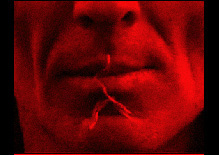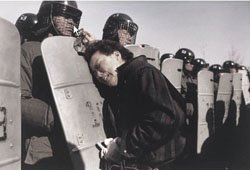Y ears ago Andrei Gromyko, the veteran Soviet Foreign Minister, was once buttonholed by his irate Turkish counterpart. “Why do you show Mount Ararat, which lies in Turkey, on the flag of Soviet Armenia? Do you lay claim to our territory?” “No,” replied Gromyko. “Why do you have a crescent on your flag? Do you lay claim to the Moon?”
Armenia is now free of Soviet control. But the Turkish-Armenian border, sealed during the Cold War years when it marked the tense boundary between Nato and the Soviet Union, remains closed. And though Armenians gaze across at Ararat’s elusive peak, they still cannot cross over into the lost provinces of their historic homeland that lie in northeast Turkey.
Something, however, may at last be moving. Ali Babacan, Turkey’s Foreign Minister, will visit Yerevan today for a meeting of the Black Sea Economic Cooperation Council, an 11-nation regional grouping set up in 1992. But the real issue for him and for his Armenian hosts is the border. Can both countries set aside their historic animosities and suspicions and dismantle the last Cold War barbed-wire barricades?
Barack Obama hopes so. Indeed, in Istanbul last week he challenged his Turkish hosts to “move forward” and establish, for the first time, diplomatic ties with their Armenian neighbours. Much more than just the border is at stake. A reconciliation between Turkey and Armenia would help to ease more than 90 years of bitterness dating back to the Ottoman massacres of Armenians between 1915 and 1917, which still cast a long shadow over the politics of the Caucasus and the West’s attitudes to Turkey.
An open border would not only bring huge economic benefits to both sides: it could also help to thaw one of the last “frozen conflicts” in Europe’s backyard, the military stand-off between Armenia and Azerbaijan over control of the ethnically Armenian enclave of Nagorno-Karabakh.
It could also help Russia to regain its balance within the turbulent Caucasus and Turkey to extend its reach to its cultural Central Asian hinterland. And it could remove some of the taboos from today’s Turkish politics, where any mention of the Ottoman killings of up to 1.5 million Armenians produces a venomous nationalist reaction.
The issues are all interlinked, and, bedevilled by emotion, are exceptionally difficult to resolve. At the heart of the stalemate lie the fears and political isolation of Armenia, a tiny country of less than three million people, that has historically been at the mercy of its powerful neighbours. Armenia, the first nation to adopt Christianity, lies on the front line of Islam, and has always looked to Russia for protection from Turkey and its Muslim Azeri neighbours. It is a role that Moscow has embraced eagerly, and one that has underpinned Russia’s military confrontation with Turkey, which for centuries has shaped the history of both countries.
But the forcible incorporation of Armenia into the Soviet Union in 1922 changed the relationship. There is lingering resentment in Yerevan of Moscow, especially after the postSoviet economic collapse when Russia put pressure on Armenia by cutting fuel supplies. The impoverished nation shivered through several winters. Armenia hoped to open up to the south. But although the border with Turkey was briefly opened, it was closed swiftly in 1993 after Armenia invaded Azerbaijan to establish a corridor to the besieged Nagorno-Karabakh, and Turkey sided with Muslim Azeris.
Turkish support is vital to Azeri hopes of regaining control of its enclave. Azerbaijan has therefore reacted ferociously to hints of a Turkish-Armenian rapprochement. It has suggested that it would use its oil muscle and interrupt supplies through the vital pipeline from Baku to southern Turkey unless Armenia made concessions.
The threat seems to have rattled Ankara. Recep Tayyip Erdogan, Turkey’s Prime Minister, poured cold water yesterday on suggestions from Armenia that the border could be opened in time for the World Cup qualifying tie in October. President Sarksyan said he hoped he would be able to cross the border into Turkey to watch the football game. Not until Nagorno-Karabakh is settled, Mr Erdogan retorted.
The Islamist Prime Minister cannot be seen to abandon his Muslim neighbour. But Turkey has also long harboured hopes that it could spread its influence far beyond Azerbaijan into former Soviet Central Asia, which is Turkic-speaking and desperately in need of some Western knowhow and investment. These hopes came to little in the early 90s. Now they are being revived. Ankara can ill afford to upset the Azeris.
Reconciliation with Armenia, however, and an end to the Caucasus stalemate could benefit everyone. It would confirm the status of Turkey as the superpower within the Black Sea council. Turkey may look to the EU as a supplicant, but to its neighbours it looks an economic giant.
Armenia, blocked to the north by the instability in Georgia and fearful of being too dependent on Russia, would have an alternative outlet to the world through Turkey. And economic cooperation could soothe historic hatreds.
For Russia, there would also be gains. Paradoxically, the Russians have never had better relations with Turkey than now, largely because of the huge volume of trade, the massive flow of Russian tourists and the reduced threat from a Nato member on Russia’s borders. But these smooth relations are fragile.
Historic competition for influence and for the region’s energy resources could flare up again. Russian actions in Georgia raised hackles in Turkey. Moscow needs a settlement to ensure that there is no new “South Ossetia” in the offing – and that the Nagorno-Karabakh dispute does not turn violent again, leaving Moscow and Ankara on opposite sides.
Mount Ararat is a peak of startling beauty, especially in the morning sun. The reputed resting place of the Ark and revered by so many in the region, it has become a symbol of division. An open border would allow all to approach its heights.








